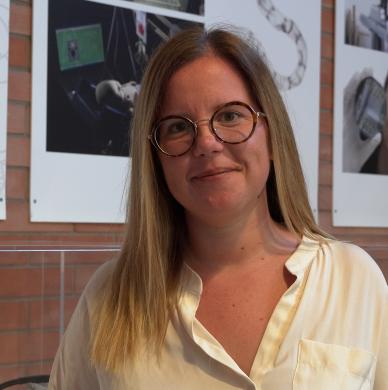
Associate Professor
BioRobotics Institute
Veronica Iacovacci
Bio
ACADEMIC POSITIONS
September 2023 - present: Assistant Professor (RTD-B), The BioRobotics Institute, Scuola Superiore Sant'Anna
September 2020 - August 2023: Marie Curie Global Fellow
November 2020 - August 2023: Honorary Researcher, Department of Mechanical and Automation Engineerig, The Chinese University of Hong Kong
April 2019 - August 2023: Post Doctoral Fellow, The BioRobotics Institute, Scuola Superiore Sant'Anna
October 2018 - March 2019: Post Doctoral Fellow, Multi-scale Robotics Lab, ETH Zurich
June 2017 - September 2018: Post Doctoral Fellow, The BioRobotics Institute, Scuola Superiore Sant'Anna
EDUCATION
November 2013 - June 2017: PhD in BioRobotics, Scuola Superiore Sant'Anna - The BioRobotics Institute
July 2016 - January 2017: Visiting Student at the Multi-scale Robotics Lab (ETH Zurich)
September 2007 - June 2013: Università di Pisa - Biomedical Engineering (BSc and MSc)
SHORT BIO
I obtained the M.Sc. Degree (Laurea Specialistica) in Biomedical Engineering at University of Pisa in 2013 (full marks, cum laude) with a thesis entitled “Design and development of a mechatronic implantable system for the refilling of artificial organs”. In October 2013 I joined the Surgical Robotics and Allied technologies Area at Scuola Superiore di Studi Universitari e Perfezionamento Sant'Anna (SSSA) as a PhD student and I obtained the Ph.D. in Biorobotics (full marks, cum laude) with a thesis on smart magnetic microsystems for targeted therapy.
From July 2016 to January 2017 I have been visiting scientist at the Multiscale Robotics Lab (ETH, Zurich) led by Professor Bradley Nelson where I worked at the development of thermoresponsive, theranostic magnetic microrobots for targeted drug delivery and on their high resolution imaging.
From October 2018 to March 2019 I was Post-doctoral Fellow at the Multi-Scale Robotics Lab at ETH Zurich and from April 2019 to September 2020 at the BioRobotics Institute of Scuola Superiore Sant’Anna. From September 2023 to August 2023 I was Marie Curie Skłodowska Global Fellow jointly at Scuola Superiore Sant'Anna (Pisa – Italy) and at the Chinese University of Hong Kong (Hong Kong – SAR) with the project (MAMBO - Magnetic swarm for liver chemoembolization).
I am currently Tenure Track Assistant Professor in Biomedical Robotics and Head of the Medical Microrobotics Lab. My research interests include medical microrobots and implantable devices with a focus on programmable magnetic structures, high resolution imaging and tracking and wireless activation at small scales.
AWARDS
Big On Small Award 2024. Assigned in the framework of the annual International Conference on Manipulation, Automation and Robotics at Small Scales (MARSS).
"IEIIT CNR" 2017 Award for the Best PhD thesis in Bioengineering. Assigned during the XXXVIII Annual School of the Italian Bioengineering Group (Gruppo Nazionale di Bioingegneria, GNB), in Bressanone (Bz, Italy).
Zeno Karl Schind Scolaship assigned for the project "MagnEtic ThErmO-Responsive mIcrorobot for Targeted thErapy" to be carried out at ETH Zurich (June 2017).
Best Oral Presentation Award. Assigned during the European society for precision engineering & nanotechnology (Euspen) Challenge 2014 - Traunreut (Germany) – 1st July – 3rd July 2014.
“Gruppo Nazionale di Bioingegneria” 2013 Award for the Best Ms.C. Thesis in Bioengineering. Assigned during the XXXIV Annual School of the Italian Bioengineering Group (Gruppo Nazionale di Bioingegneria, GNB), in Bressanone (Bz, Italy).
Research
The main aim of my research activity is to develop novel smart therapeutic solutions for acute and chronic pathological diseases as well as for advanced diagnosis. Starting from my master thesis, I have been studying and developing smart solutions for implantable artificial organ. This interest led in these year to several funding opportunities and to the development of smart solutions and smart materials for artificial Pancreas, Artificial Bladder systems and other implantable devices.
During my Ph.D. I approached the study of smart systems featured by micrometric dimensions and exploiting magnetic fields as actuation method. Currently my research activity is mainly related to microrobotics, smart magnetic systems for targeted therapy with a particular focus on making micro/nanotechnology based therapeutic paradigms safer and highly controllable thanks to the inclusion of clinical imaging modalities in the control loop with the final aim to bring microrobots to the clinical practice. I am currently Principal Investigator of the I-BOT project that aims at developing the first generation of Implantable Microrobots.
